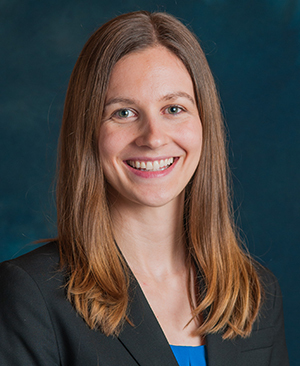 Amy K. Nuttall
Amy K. Nuttall
While working at a childhood bereavement center after college, Amy K. Nuttall Ph.D. ’15 saw firsthand how resilient kids can be.
Nuttall met many children who were taking on caregiving roles typically reserved for adults—looking after siblings, handling chores, providing emotional support—after the family experienced trauma or acute stress, such as the death of a parent.
“I saw kids who were coping really well, and I saw other kids who were taking on a lot of responsibility,” Nuttall said. “And I became very interested in the different roles children take on—the positive ways they cope and the ways they may become overburdened.”
Those experiences inspired Nuttall to explore those issues in her research, first at Notre Dame, where she earned a Ph.D. in developmental psychology, and now at Michigan State University, where she landed a position as an assistant professor in the Department of Human Development and Family Studies and directs the Family Stress Lab.
Her scholarly breakthroughs are already attracting mainstream attention—one paper published in the Journal of Family Psychology prompted an article in Time headlined, “Kids with Too Many Duties Grow Up to Be Reluctant Parents.”
“My training at Notre Dame prepared me very well for going straight to a faculty position at a research institution,” Nuttall said. “When I went on the job market, I was very fortunate that I had the quantitative skills that are so valued among psychologists who are substantive researchers.”
Finding a Mentor
After receiving a bachelor’s degree in psychology from the University of Colorado in 2006, Nuttall chose Notre Dame over eight other Ph.D. programs. One reason was because of its graduate minor in quantitative psychology. The program provided important statistical credentials for her research, as well as the opportunity to work with its highly regarded group of child psychology scholars.
Kristin Valentino, the William J. Shaw Center for Children and Families Associate Professor of Psychology, served as Nuttall’s mentor during her studies and was one of the reasons she came to Notre Dame.
“I wanted a mentor I could work closely with, who had data connected with my interests, and Kristin was a perfect fit,” Nuttall said.
Nuttall wanted her doctoral studies to focus on parentification, or the act of children assuming adult caretaking roles in their families, which connected to Valentino’s research on child maltreatment.
Early on, Valentino encouraged Nuttall to develop her own area of study that built on and complemented Valentino’s work. Working with extensive longitudinal data sets collected by Professor John Borkowski, Nuttall focused on the effects of childhood parentification on new mothers’ parenting.
“Amy is interested in how a history of parentification during childhood may affect an individual’s ability to parent and, subsequently, affect the next generation’s development,” Valentino said. “This work is really important, because parentification is a form of emotional maltreatment that has serious negative consequences for children—but often goes undetected.”
Helping Children Cope
Nuttall spent the fall semester at Michigan State working on manuscripts and data collection, and she began teaching graduate-level statistics in the spring semester. She continues to focus her research on processes of resilience and risk related to family stress.
Ultimately, Nuttall hopes to develop her own interventions that can be put into practice with families experiencing trauma or stress.
“It’s really important to me that I’m always focused on the idea of how we can promote children’s resilience,” she said, “and help children learn to cope with stress in adaptive ways.”


